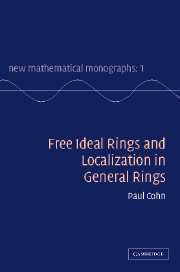Book contents
- Frontmatter
- Contents
- Preface
- Note to the reader
- Terminology, notation and conventions used
- List of special notation
- 0 Generalities on rings and modules
- 1 Principal ideal domains
- 2 Firs, semifirs and the weak algorithm
- 3 Factorization in semifirs
- 4 Rings with a distributive factor lattice
- 5 Modules over firs and semifirs
- 6 Centralizers and subalgebras
- 7 Skew fields of fractions
- Appendix
- Bibliography and author index
- Subject Index
3 - Factorization in semifirs
Published online by Cambridge University Press: 22 August 2009
- Frontmatter
- Contents
- Preface
- Note to the reader
- Terminology, notation and conventions used
- List of special notation
- 0 Generalities on rings and modules
- 1 Principal ideal domains
- 2 Firs, semifirs and the weak algorithm
- 3 Factorization in semifirs
- 4 Rings with a distributive factor lattice
- 5 Modules over firs and semifirs
- 6 Centralizers and subalgebras
- 7 Skew fields of fractions
- Appendix
- Bibliography and author index
- Subject Index
Summary
For the study of non-commutative unique factorization domains we begin by looking at the lattice of factors and the notion of similarity for matrices in Section 3.1. The resulting concept of non-commutative UFD, in Section 3.2, is mainly of interest for the factorization of full n×n matrices over 2n-firs; thus it can be applied to study factorization in free algebras. Another class, the rigid UFDs, forming the subject of Section 3.3, generalizes valuation rings and is exemplified by free power series rings. We also examine various direct decomposition theorems (Sections 3.4 and 3.5), but throughout this chapter we only consider square (full) matrices, corresponding to torsion modules over semifirs. The factorization of rectangular matrices, which is much less well developed, will be taken up in Chapter 5.
Similarity in semifirs
To study factorizations in non-commutative integral domains it is necessary to consider modules of the form R/aR. We recall from Section 1.3 that two right ideals a, a′ of a ring R are similar if R/a ≅ R/a′. In the case of principal ideals the similarity of aR and a′R (for regular elements a and a′) just corresponds to the similarity of the elements a and a′ as defined in Section 0.5 (see Proposition 0.5.2 and the preceding discussion, as well as Section 1.3).
In a semifir it is possible to simplify this condition still further.
- Type
- Chapter
- Information
- Free Ideal Rings and Localization in General Rings , pp. 186 - 224Publisher: Cambridge University PressPrint publication year: 2006

